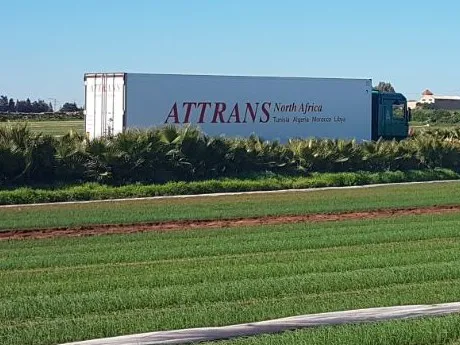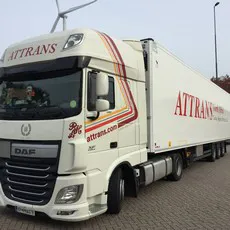Importers of Moroccan products aren’t the only ones looking forward to the start of the season. Transport and forwarding business Attrans North Africa is also looking forward to the first vegetables grown in Morocco and Tunisia that can be loaded. Erik Dekoninck sees that the production in North and West Africa is growing, and that offers opportunities to the transport company.

“Importers can extend the season thanks to the production in Morocco and Tunisia,” Erik mentions an advantage of the Moroccan production. The relatively short distance between North Africa and Northern Europe is another advantage. “With a double crew we can reach the Netherlands, the UK, Germany or France, for example, from the port in Tangier within 48 hours. Morocco suddenly becomes a lot nearer then.” For Morocco, fruit and vegetables are ‘big business,’ but production is also growing in other countries in the region. The importance of Tunisia in the production of vegetables is also increasing. Substantial surfaces in greenhouses have now been built and taken into use.
Morocco invests in West Africa
Additionally, Moroccan growers are expanding their production in West African countries. “Some companies produce in Morocco and extend the season with production in Senegal, and they expand the production over there, but Dutch companies are also investing a lot, primarily in Senegal right now.” These products also have to be transported via roads, because sea cargo is often not an option. “Sea cargo isn’t ideal, because transit times are too long,” Erik explains. From Senegal, a lorry can reach the Netherlands faster than a boat. Moreover, it’s more flexible regarding destinations in the EU.
With the planned expansions of production companies in Senegal, Erik expects demand for transport to increase in the coming years. “Quick, efficient, with modern trailers and track & trace,” he sums up some of the requirements of the transport. “That’s a niche, because not everyone can do that: 24-7 online temperature observations, daily communication during the entire transport and carefully insured.” For line transport from Agadir to Rotterdam there are plenty of choices among transport companies that offer this service. “But for two different products that have to be transported at different temperatures, that’s a completely different story.”
 More transport needed
More transport needed
Attrans North Africa, located in Breda, is part of the Maltese group Attrans. Besides the branch in Breda, the group also has a branch in Alblasserdam and Genoa, Italy. That office is only involved with the transport to Malta. Attrans North Africa focuses on North Africa, as can be guessed from the name. In recent years, West Africa has also become more important. “We do a lot of niche transport, we’re specialised in that,” Erik says. That involves grouped transport from Europe to Morocco, Algeria, Tunisia and further into West Africa to Mauritania, Mali and Senegal, for instance. Weekly grouped transport to Libya is also offered. “In future, this will be offered even more and even further away.”
Thirteen people are currently working in the office in Breda, they’re practically always looking for new workers. The challenge is that the staff speaks the languages that are needed. “Not a lot of people can be found who speak French, Arabic or Moroccan. We’re permanently looking for those.”
Ready-to-wear clothes are an important product group, as are pharmaceutical products and cold and frozen products. “Not many transporters drive to North Africa with cold transport,” Erik says. “We also transport a lot of bumblebees and insects to these countries. They’re used to pollinate the production. That’s incredibly interesting.” For the trip from North Africa to Europe, products from various sectors, including ready-to-wear clothes, industry and fresh produce, are loaded. “Were waiting for the start of the fresh produce season,” he explains. That will probably be in October this year. “In the first week of October we’ll start with vegetables, tomatoes, avocados, beans, pretty much the entire range.” This is followed by citrus, grapes and figs.
Own fleet of trailers
“Considering the price level on the market, the distance that has to be driven and the difficulty of the market, we use Moroccan drivers for charters for the transport from Morocco,” Erik says. These drivers work for the transport company based on contracts. “They drive with our own trailers.” The fleet of trailers of Attrans North Africa consists of more than 400 trailers. For other routes, the drivers also come from Spain and Eastern European countries. The latter group mostly drives to Marseilles in France, where the trailers are loaded on the ferry with the destination of Tunisia. That same ferry drops trailers from Tunisia in Marseilles, which are then picked up by the drivers.
In recent months, the route of the refugees from Morocco to Spain appears to be used more often. For now, Attrans North Africa hasn’t experienced any problems yet from the flow of refugees. “That’s partly because of the measures we took,” Erik says. Shippers are regularly visited in Morocco, as are the locations where loading takes place, and the ports. “Guidance is provided to make sure no one can crawl into the containers. Besides, these are box trailers and not curtain-side trailers, these are more difficult to open.” Regular inspections of the trailers, seals and doors in the ports in North Africa and Europe limit the risk.
More information:
Attrans North Africa
Erik Dekoninck
e.dekoninck@attrans.com
www.attrans.com
